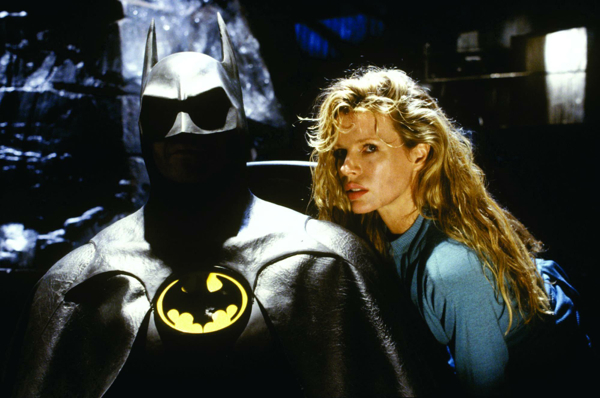Movie reflection by Greg Carlson
Following “Sign o’ the Times,” his third theatrically-released feature as performer and second as director, Prince’s next cinematic surprise was the soundtrack to Tim Burton’s juggernaut “Batman” in 1989. Unfortunately, the prolific artist did not appear in the film, even though I recall discussing with friends the wildly nerdy notion (rumor?) that Prince would kill it in a violet cowboy hat as Shame should he get a later shot as a “guest villain.” As funky, lush, and filthy as much of his recent output – “Batman” was only two years after “Sign” – the album has been unfairly maligned, although a number of articles going back at least as far as Steven Hyden’s tellingly titled 2012 A.V. Club piece “Prince’s ‘Batman’ Soundtrack Is Not the Embarrassment It’s Reputed to Be” root for it.
Prince followers continue to be divided on the quality and legacy of the record. Some argue that the “for hire” conditions of the music’s use by the Warner Bros. machine and Burton as savvy cross-promotion constitutes a level of market-driven synergy and “selling out” in violation of Prince’s previous alignment with “artistic integrity.” Most accounts, however, indicate that Prince’s desire to participate in the project was earnest, eager, and genuine.
Additionally, a number of critical reassessments of Prince’s “Batman” have attempted to stake out a position favorable to the record, including Ira Madison III’s bold headline claim that “Prince understood Batman better than anyone.” Madison’s hyperbolic introduction calls the collection “…one of the most significant pieces of American pop culture criticism,” but the essay’s thesis – that Prince, like Batman’s gatekeepers and handlers, could closely relate to the necessity of evolution – also makes room for the idea that Prince’s “remixing and reinventing a classic character” anticipates the web-assisted tendencies toward constant rebooting of franchise properties. In other words, Prince was once again ahead of his time.
Six of the album’s nine tracks would be excerpted in the film, but only two would enjoy status as fully featured diegetic showcases. Replacing Burton’s original temp selections of “1999” and “Baby I’m a Star,” “Partyman” and “Trust” complemented and defined top-billed Jack Nicholson’s take on the Joker as, alternately, an anarchistic visual artist/drum major and a petulant and narcissistic master of ceremonies. A new generation of fans too young to have surfed the crest of “Purple Rain” would come to know Prince through those unusual scenes (and the choice of a “Scandalous” edit instead of “The Arms of Orion” during the end credit roll), but MTV’s heavy rotation of bizarre and unlikely number-one single “Batdance” would overload the grid.
“Batdance,” accompanied by the ace music video directed by Albert Magnoli and choreographed by Barry Lather, reportedly turned up as an eleventh hour replacement for “Dance with the Devil.” The swap was a fortuitous one, because even though the song does not appear in the movie, it has come to represent Prince’s musical contributions to the project more than any of the other “Batman” tracks (which really construct a fascinating parallel narrative to the one Burton expressed). Bummer that off-screen collaborator Kim Basinger was played by “All This and Brains Too” doppelgangers, but the “Scandalous Sex Suite” makes up for it. And Prince’s half-Batman, half-Joker “Gemini” character looked as sharp, or even sharper, than Nicholson or Keaton in costume.
During the kitchen sink chaos of “Batdance,” Prince chops up workprint audio snippets of lines delivered by the Joker, Bruce Wayne, and Vicki Vale, and then mixes them with a go-for-broke reference to the iconic two-syllable chorus of Neal Hefti’s 1966 television theme. Somehow, it works. Michaelangelo Matos and others have written about Prince’s off-balance relationship to hip-hop, particularly in terms of the clumsy incorporation of, as Matos has it, “MCs of limited ability.” Yet “Batdance” is in some strange way Prince’s most successful sustained example of creative sampling. The song and the soundtrack deserve a place of pride in Prince’s discography.
